Top: Essendon chief executive Xavier Campbell. Left: List manager Adrian Dodoro. Right: Football manager Dan Richardson.
I have been talking about cultural issues at Essendon for a while now. That annoys people because they think it’s too convenient and cliched. What does it actually mean, they ask.
Well in a nutshell, for a long time, and I’m talking decades, for Essendon I think it’s been about an inflated sense of importance, and essentially a failure to make the right decisions because its so-called “big club” status has offered a false sense of security.
It’s been about a failure to follow process (drug saga, anyone?), a refusal to admit error, and too much power either in the wrong, or too few hands, be it inside or outside the physical surrounds of the club itself.
Every time, particularly this week, when I tweet something about the subject, I’ll get a lot of responses about Adam Saad or Joe Daniher, or Ben Rutten. But this is about something a lot bigger than just this particular group at this particular time. Because the processes of the club are fatally flawed.
It’s not just recruitment, or list management, or coaching. For example, what about development? I asked a couple of months ago on here name me a bona fide AFL champion Essendon has produced of its own accord over the past two decades apart from Jobe Watson? Answer? There isn’t one. What does that tell you?
And if player development is a real priority, why has there been a virtual revolving door of development coaches and staff over recent years, too many to recall here in one go.
I’m neither here nor there on recruiting and list manager Adrian Dodoro, but I bet you can’t name another club at which one man, given the lack of on-field success Essendon has had for 20 years, would have continued to hold those roles all that time.
Doesn’t that say a lot about the inability of this whole club to hold itself to account? To not just talk about setting standards, but be prepared to act when they’re not being met?
And if the administration isn’t held to account by itself or by a board which seems to have all the rigour of a wet lettuce leaf, why is it any surprise that players start wondering why they should be held to account either?
The single best comment on this cultural stuff I’ve heard in the last week came from Matthew Lloyd last night on Footy Classified. It was on the back of a discussion about the range of draft picks Essendon could expect for Saad and Daniher.
He said: “It doesn’t matter who comes in, if you cannot get the environment right, they’ll fall by the wayside, too.” Lloydy gets it. I wish more Essendon people did.
People want names, scapegoats. But this isn’t all just about Dodoro, or chief executive Xavier Campbell, or football manager Dan Richardson. Or Rutten. Or former president Lindsay Tanner. Or the new one in Paul Brasher. Or the board. This is a collective failure. Indeed, one which while it includes, also precedes them.
They’ve all been at fault in letting an inadequate environment drift along. In a series of bad appointments, bad decisions, in identifying issues too late then knee-jerk reactions. Misreading the list (again). Losing the wrong people on and off the field.
Of failing to see the increasing disconnect of supporters, who are sick to death of the never-ending spin and corporate speak, the pat video messages from players, or when the communications they get from the club aren’t straight up honesty about why things aren’t going well, exactly where the club is at and what needs to be done, but insulting offers of discounts on crappy merchandise.
Of failing to recognise that while headquarters at Tullamarine may look flash on the inside, for fans who want to get close to their club, on the outside it’s a barren, soulless cold and uninviting place.
Drive in the Melrose Drive entrance and there’s not even any signage to tell you you’re there. That stuff actually matters, guys. Ignoring it all repeatedly shows a disturbing tone deafness. “Sure, we got blown away by 10 goals, but here’s a great offer of 20% off a useless sponsors product you don’t need or want as our way of saying thank you.”
Is this all too big picture? OK, I’ll give you a few specific questions. Like on Saad and Daniher. Look, it’s great to talk tough about players needing to buy in, and if feathers are ruffled so be it, and feeding little damaging anecdotes about guys like Saad to the media so fans will turn on him and call him selfish.
But is it just rationalising the loss of a player who only a couple of days ago you were trying desperately to keep?
Essendon had a chance a year ago to make a stand on those so-called standards when it knew Rutten, who’d been there a year as an assistant, would be effectively coaching in his own right in 2020. It could have traded Daniher and Orazio Fantasia and said to the playing group “you’re either in or you’re out”.
Instead it chose to let the tail wag the dog for another year during which standards and morale deteriorated further. See, that’s about culture. And another 12 months of treading water because you won’t make tough decisions says only one thing: a weak culture.
Perhaps it’s not so surprising then that the Dons didn’t want Rutten fronting the media even though he was coach, instead wheeling out Worsfold to repeat the same deadpan mantras about “learnings”.
And why would he do anything else when it wasn’t his team or his coaching? That disrespected fans more than anything. They’re smarter than you think, guys.
Essendon seems to have an obsession about optics, and about the world caving in if it somehow has to admit it got things wrong. But guess what, fans appreciate that a lot more than corporate gobbledygook and spin. And they know an arse-covering exercise when they see one.
Speaking of which, let’s talk about that disastrous coaching succession plan. I know that plenty of people who it impacted upon thought it was a terrible idea. Campbell was a big fan, though. Why?
Well, maybe go back to John Worsfold’s premature contract extension at the start of 2018 after the virtual write-off of 2016 when Essendon fielded a virtual reserves team, and then in 2017 limping into a finals series and again getting destroyed in an elimination final.
That didn’t need to happen. This isn’t a slight on a guy who at least took on what became the most thankless coaching job in football, but it’s not as though rival clubs were exactly beating a path to Worsfold’s door.
That extension took in 2019 and this year. By the end of the first of those two years, the club decided it wanted someone else. But it’s pretty hard not to conclude the CEO was so worried about the optics of admitting they’d got the extension wrong that they got too clever by half in engineering a never more than very awkward-looking dual coaching set-up.
PLEASE HELP US CONTINUE TO THRIVE BY BECOMING AN OFFICIAL FOOTYOLOGY PATRON. JUST CLICK THIS LINK.
What about on-field leadership? Well, the player leadership group has been a bit of an elephant in the room. And for good reason.
They might have delivered some very good and at least serviceable football for Essendon, but Jake Stringer, Devon Smith and now Dylan Shiel aren’t renowned among coaches as being the most team-oriented players, and there’s a fair argument none had spent enough time at their new club to be officially anointed leaders, as the latter two were this year.
But players vote on that group. They elected them, which might also say a bit about how undemanding their own standards have been. Again, the administration copped out by refusing to overturn a decision it had grave reservations about.
Zach Merrett, meanwhile, was voted out. That may or may not have been the right call. But if you’re going to do that, you at least owe him an explanation. And my understanding of that schemozzle is that Merrett never actually heard officially from the club about it until he found out via the media. That’s not good culture.
What’s also not good culture is when you shut out the members from even effectively having a say on who represents the club at board level.
As I mentioned a couple of weeks back, that’s effectively what’s happened with the board election process. I think Kevin Sheedy has plenty to contribute, I think he’s prepared to ask questions. Does he need to be on the board to ask them, though?
But now, because he’s been appointed by the board to fill casually the position Katie Lio resigned from to allow him on, he’ll be taking her position on the election ballot paper in December, endorsed as a ticket with football director Sean Wellman, also up for re-election.
That effectively renders an election redundant, because any other potential candidates – and there were plenty – now know they have no chance of beating two club premiership heroes.
It’s smart politics from the administration, avoiding potential negative publicity, but it’s also made a mockery of a democratic process, effectively locking members out of having a say in the running of their own club. They don’t even have a public members’ forum anymore to voice any concerns they may have – that’s been done away with, too.
Again, it’s hard not to see conscripting Sheedy on to the board as anything but another arse-covering exercise, and a shiny new toy to wave at fans as a diversionary tactic. That’s culture, too. A dictatorial one.
Two episodes for me best sum up Essendon’s cultural malaise. The first is from late 2017, when the Bombers, fighting for a finals spot, played tepid football all day and were eventually overrun, at home, by Brisbane, then bottom of the ladder with two wins.
It was a stinker, and a disappointed Xavier Campbell tweeted the following mild rebuke: “Not good enough. Not even close. Fans deserve so much better. 41,000 came out today and we let you down.”
Pretty mild stuff. Incredibly, the playing list was so livid that Campbell then had to apologise to the leadership group. What does that say about the strength of a club’s culture on either side of that equation? And that was four years ago.
The other story is worse. And it’s from even longer ago, back in 2015. It’s about when Essendon was looking for a coach to replace James Hird. A shortlist of candidates was assembled. It featured some pretty impressive names.
But, unknowingly to those who assembled it, it was also redundant. That’s because then-president Paul Little had made a unilateral decision to jump in his private plane, fly to Adelaide, and attempt to hire Worsfold as coach.
It’s fair to say the board was less than thrilled when they knew about that only when they saw it on TV. So were those so-called coaching candidates when they got wind of it.
A pity, too, because a couple of them have since gone on to become pretty highly regarded on the coaching front. Had they made even half the impression at Essendon they have subsequently elsewhere, the club might have avoided some of the mess it is now in. But not all of it, mind you.
Because this once mighty club’s greatest failing might be its seeming inability to concede just how far it has fallen. Even now. After this stinker of a year and with key players wanting out. Yes, that’s about culture, too. A culture of denial.
Matthew Lloyd was talking about players when he observed that even the best, if the environment wasn’t right, would fall by the wayside.
Essendon’s environment definitely isn’t right. It hasn’t been for a long time. And unless it first wakes up to that fact and then takes some pretty drastic action not just on the field but in much of its operation, a whole club might find itself similarly falling by the wayside. If it hasn’t already.

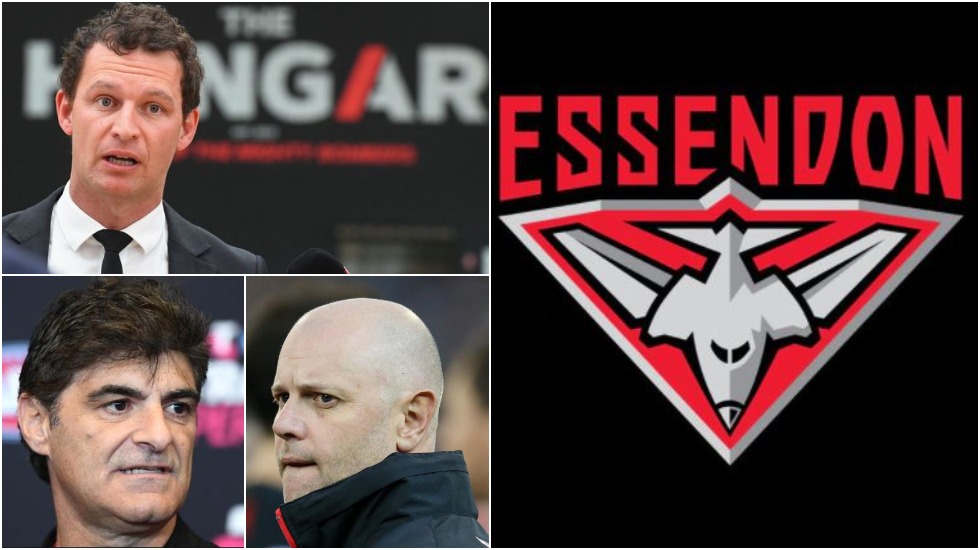
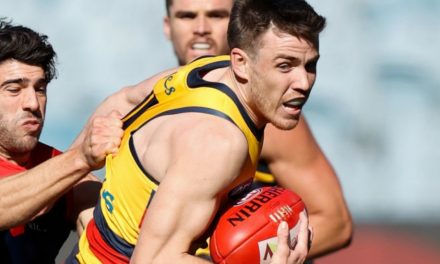
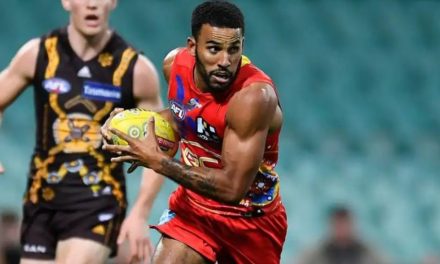
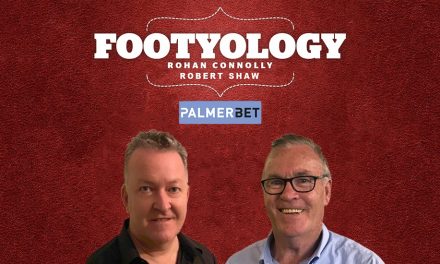
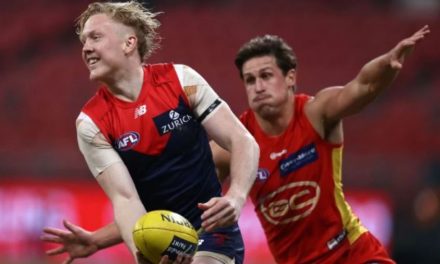

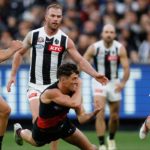
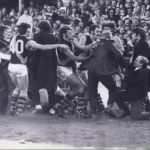



Things have changed in a year. The player choices look brilliant, but all the players can play. They just need a supportive. atmosphere.
The coaching changes are starting to work because they are freed up,
I believe EFC could do well, considering all the points that Rohan has mentioned here, to look for a new 2nd home outside Victoria.
Reason 1 – The footy media is relentless in Victoria. The supplement saga was a gift to the media.
Reason 2 – The playing group needs to bond outside the fishbowl of Melbourne. It won’t hurt our star players to spend some time in a city or town where few people recognise them.
Reason 3 – EFC’s ‘Big Club’ brand has become more of a liability in recent years as our form has dropped away. The only way to earn the respect of the football World is to win more games than we lose.
I hope Sheedy can work some.magic but I am not holding my breath. I respect Sheeds without hesitation but he has his work cut out for him, as Rohan has so eloquently outlined in this article.
Final comment. I hope we can all resist the temptation to blame the players. They are paid well to play footy but the club environment is critical for success.
Bombers Forever.
Forever Bombers.
17,000 members didn’t sign up this year from 2019. I can see the same amount if not more not signing up next season. I am a silver member with my 2 daughters and son who is 12 years old and is (was) a typical little boy like myself who was fanatical red and black. He said to me he’d rather watch it on tv next season and has lost his passion for the club. This would be happening in thousands of bomber households across the country and should be the biggest wake up call for this deluded organisation. I won’t be signing up until there is real change. Get a grip before it’s too late.
I agree. Even Dodoro’s antics during trade period – they’re not endemic of a professionally run club. More like a fan boy getting emotional. You might win the battle by making every deal drag out to the last 5 min of trade week but lose the war by putting all other clubs offside and missing out on on-trading.
Contrast that with how a Geelong conducts most of their business.
The culture is unprofessional.
Being a teacher, I put much of the blame at Worsfold and his stated plan in 2018 to facilitate a “player-led” culture.
In my experience with classes of both adults and teenagers, I have been able to point out problems and flaws with the class as a whole or with individual students and have those criticisms accepted; however, if students made similar criticisms, there is a whole rage of competing egos and status hierarchies that inhibit those criticisms being considered and acted upon. On occasions, student-to-student criticisms have seen it led to a kind of compliant backdown between rival students but also lingering hostility between them. In short, they have usually accepted it from me, but rarely from each other.
Aside from gaining authority from the title, I also appreciate that authority is also gained through being the expert on culture and communicating what it stands for. If a coach is telling players it is up to them to decide what Essendon stands for, they are likely to come up with a while range of different ideas that could be debated leading to confusion or just default to thinking playing for Essendon is about collecting a pay packet. This is problematic because aside from players not being on the same page, the coach’s cultural authority has not been established. Worsfold could have been there selling recruits the tradition of Essendon. For example, he could have been selling the fact that this is the club of Coleman, Watson, Danihers, Reynolds, Lolyd, Hird. This is the club that went back to back in 84/85 and had the single most dominant season in 2000. Essendon is about family, with 4 Daniher brothers playing together, pioneering the Indigenous voice in the AFL and paying tribute to all those who have donned the red and black. It would have been a message that would have endeared him to players and fans alike. Instead, we just get a whinge about Essendon fans being too demanding, entitled, unable to appreciate the salary cap or draft etc. Listening to that, I felt he was never one of us, never bought in to a culture himself and thus had nothing to sell it to the players.
Twice, history has proved Worsfold wrong on “player-led” cultures. At West Coast, that player led culture led to significant drug use because the leaders were obviously quite chilled with it, which in turn to the likes of Judd leaving. Winning obviously papered over the cracks but West Coast was not a happy place immediately post-Worsfold. As Mathew Lolyd diplomatically pointed out, it would have been nice of those in control to tell Wosfold last year that the club was grateful for his service but it was time to move on.
Spot on. Drug scandal, appoint Worsfold as coach, really? Game plan? There is also one major common factor contributing to this and previous fiascos, perhaps he has photos? He’s not slow to point the finger at others.
Great read about the issues plaguing the “Mighty-Ones” as ironically known in our household. Especially agree with Essendon’s inability to draft, coach, nurture, develop and keep top-class players over the past two decades.
During that time, I think Essendon remained a down to earth, suburban club in touch with the local community whilst at Windy Hill, but unfortunately the rest of the competition left them behind in both football and administrative professionalism and excellence. After the well documented erosion of governance and accountability, I think the club over corrected to the extent that In 2020, the place is a heartless, soulless, sterile joint in Tullamarine, (seemingly a far cry from the fun and camaraderie of the Windy Hill days), the new environment cultivated by corporate supporter types and politicians without a feel for the game or the grassroots supporter base. In my opinion. I believe what has happened at Essendon is similar to the impact people of similar ilk had at Cricket Australia focusing singularly on money at the expense of an organisation’s culture and values and similarly resulted in player mutiny. Every position on the board should be up for grabs allowing members to move these people in positions of power on. Lack of democracy a concern.
I think the upshot is after two decades of decline, no quick fix exists, not even a medium term solution, I am under no illusions, it will take Essendon a “blank canvas” & another decade of rebuilding to be a top four proposition, by which time the living memories of my son and daughter at around 30 years of age will never have known a strong Essendon team. Hoping the EFC still exists based on its current performance trajectory?
Apparently, Smith investigating options and North courting Parrish.
I wonder whether the “powers that be” at Tulla are aware of the general feeling of hopelessness pervading Essendon members?
This unfortunately is a fair assessment of our once great club.
Like most things in life, only once you accept and recognise a mistake or issues can you make inroads into fixing it. But it sadly feels that we are a long way from that.
It always concerned me that we were poaching so many people from Richmond to ultimately be told we NEED to play like Richmond. This may be right at the moment, but if this is the mentality of following Richmond we will always be one step behind as we will not have our own brand.
In relation to player movement, quality players will always come and go, but with the reports of so many on the list being ‘unhappy/unsettled’ its a real worry which needs to be sorted as soon as possible instead of saying your ‘either in or out’. Why are they feeling like this?
And in no way am I saying that Rutten should take a backward step, but I would have thought that in the time that he has been at the club, knowing that he will be taking over, his time would have been spent building strong relationships and trust with ALL players………So what has he been doing all this time? Its clear the old hard-arse style of coach is utilised less, with a more personable manner being valued and effective………… Which one is Rutten?
My concerns are to many for our club and its future to list in this post………
Thank you Rohan – you articulated everything I have thought to the letter. I have followed Essendon for 66 years and must say that everything we have seen on the field over the last 19 years is the worst of this great Clubs history. The teams of the 70’s were not much better in their ability to win, but you turned up for them every week and were proud of them because they tried their guts out. Essendon teams today have around 12 players on game day that are essential passengers on the backs of a core group breaking their necks week in and week out. When you witness this you know that it is not simply about coaching or the ability of the players, but more about desire and commitment …. ingredients that appear only when love of the Club and the jumper are created by the environment of the whole institution
Firstly, I’m a Calrton member so i think i speak with some authority here. I have believed for a while now taht the Blues are, at best the 5th biggest club in the state, behind (in no order) The Pies, Tigers, Hawks and Bombers. If I’m really honest, they ar eonly just ahead of Geelong based on proximity. THere is something to be said about carring yourself as a “big club” and for mine, the Blues haven’t done that in 20 years.
It feels that in the last 5-7 years, they finally decisied to tear it all down and start again. Not every step has worked, but the framework is there, and it feels (finally) that 2021 will be the first year that the Blues can finally start to even talk about being a “big club” again.
My senses say this is where the Bombers sit. Perhaps too proud to start again? Too concerned with losing that halo? The reality is, for clubs like Carlton and Essendon, there will always be a chance to ‘start again’. The fans will forgive and let it happen, if a plan is in place. There are enough rusted on supporters to make it happen. The Dons are best served by ahard reset, a few years ‘in the winderness’, and a rebuild back to the upper echelon on the league. A strong Essendon is a boon for the whole AFL. A weak and middling Bombers? Not so much.
Thank you Rohan for having the intestinal fortitude to expose what many of us, are feeling.
As far as Sheedy being on the Board is concerned, my thoughts are, this act by the club was to shut him up. He can not criticise the club, at least not out loud and cause a rift. As for Sheedy mentoring Rutten, once again it shows the club’s ability to orchestrate yet another cover up and a band aid approach to an on-going problem. The supporters and members are tired of being treated like mushrooms and fed media speak, compost and continually pushed to buy merchandise. The marketing genius of the CEO, who somewhere along the way, lost focus of the primary reason for the EFC existence, to play football and win premierships.
The club is treading water in nowhere land and many people who have followed this once mighty club for a long time, are disappointed and angry at how the club is on its knees and has become the laughing stock of the AFL and seems to be spiralling into a void.
I have followed this club for seventy years. Those in power, with the power to make changes, pretend there’s nothing wrong. Their blindness is reflected in their belief, the club was in a premiership window, they pretend there are no problems, none worthy of attention. What is desperately needed is honesty to regain clarity and faith. To tackle any problem it must first be recognised and claimed as existing. The players are simply mirroring what is askew right back in Management’s face. Once again sadly, the club excuse and blame, this time, it is the players for not wanting to remain at the EFC.
This current behaviour feels like we are back in the quicksand following the supplements saga. The environment is toxic and only recognition of the problem change can heal it. It also speaks volumes and shows the club still haven’t learned since that time and those who could effect change and still, sadly, aren’t listening, thank goodness you are.
Once again, thank you.
Sincerely,
Margotdeepa Slater-Oliphant.
Merimbula, NSW.
What does Essendon stand for these days?
Once it was the champion of indigenous players and rights.
A sad shell, a corporate club with a Carlton mentality.
Not prepared to do the hard work.
Adrian Dodoro is merely a manifestation of Essendon.
Difficult to deal with, presumably at the behest of other officials at the club.
Player development is not working.
Living on past glory of 20 years ago.
Old thinking, fan boys on the board.
The Tigers had to be turned around with a long term plan that was laughed at. But it worked.
We have a club to be proud of.
Can’t say the same of Essendon.
Spot on. Having followed the club for fifty years it breaks my heart to hear the lamenting Terry Daniher and Matthew Lloyd. Our club is anodine. Bland. We cheer when Walla gets the ball but elsewhere is largely disappointment. The Roman Empire writ small. Twenty odd years of mediocrity.
It’s not about the players in the end. They can all play. Just the leadership. Rutten and Caracella can coach, look at their results.
Dear Rohan,
spot on I’ve been bomber man member and supporter ex cheer squad et from 1962 on, never seen a year with so much anger and spite towards players leaving. to be fair Daniher has treated the club poorly, took all the money and the medical treatment and then strolls out. Please keep updates re your observations as fans have had enough, most believe Rutten is not the man for the future. Cheers.
This is an interesting one – I remember disregarding as gratuitous rumour when told by a health practitioner with staff connections to the club in ealy 2019 that the players didn’t like Rutten. Especially when they then went on to anoint him successor to Worsfold, as surely they’d not be blinded by appearances and deaf to disquiet?! RoCo has nailed it in this piece, named what we have suffered through as members, and hopefully the club take note!
Brilliant article Rohan. Completely agree with everything you have said. Except for one thing. I am not so sure the Sheedy appointment holds much water with supporters. I have spoken to many Essendon people and they consensus is that while much loved, Sheedy is a lame attempt to milk past glories. He is yesterday’s man. Likewise on major Essendon fan forums, the mood is cynical about Sheedy. So my point is, a well credentialed individual will attract a large groundswell of support. Someone who will not suffer the lack of accountability enjoyed by so many senior executives at the club. Someone who knows football, has a high public profile and is honest enough to say it as it is.
Someone like you Rohan.
Hi Rohan. Just read your assessment of Essendon and agree 100%. My name is Gai Williams and I intended to nominate for the EFC Board as a members advocate this year and had a surprising amount of support on social media. I decided to stand aside when the Kevin Sheedy news broke. However have been contacted by a number of members to still nominate and force an election. Am considering doing so as I have a passionate desire to help fix our club and so many members are feeling disenchanted and also disconnected from the club. Would love to have a discussion with you.
Hi Gai,
Thanks. If you can shoot me an email to info@footyology.com.au I’m more than happy to have a chat.
Cheers,
Rohan
Thanks, Rohan. I very much appreciate you raising your voice on this subject… my only criticism is that the same central theme could have been employed in 2010 and been just as correct. The media in general has ignored Essendon’s continued failings for quite some time now and I don’t really understand how a club that big has flown under the radar for so long. I’ve ached for commentators to start criticising Essendon, not just for the on-field output of a given game or a given season, but for the last two decades.
Fans have watched a team that hasn’t looked like it was going to get any better since 2000. By the end of 2001 the team was cooked and with key players being traded away due to miscalculations in forecast salary caps the best way back was a rebuild – but no, they brought in a slew of all-so-ran players and have ended up a very mediocre team because they couldn’t seem to bear the idea of dropping down the ladder.
The club and the fans constantly overrate the list and the potential positive impact of a few big-name inclusions – and they also overrate the quality of the club as a whole. It was the culture of the club as a whole (unfettered by the lax managerial standards) that resulted in the drugs saga. It was a perfect storm of silo-based decision-making, poor oversight and weak personnel that allowed the dispensation of unknown substances from a basement office to start and continue.
Worsfold was around for two years too long.
Lloyd’s right – when people talk about Essendon going to the draft, there’s an assumption that those players will make a difference – but Essendon has been terrible at developing players for over a decade and a half. Why would that change now. Unless something changes radically, they’ll come along and play six or seven years of mediocre football – because that’s what Essendon does.
My only source of hope is that Rutten, having seen how to develop a selfless playing culture at Richmond will have the balls and the leeway to impress that upon the club and the team. Given the nature of the club, I have very little confidence that will happen, however.
Additionally, thank-you for calling out Sheedy’s appointment to the board as the distraction it is. I see it as fan service – but this fan isn’t keen. The culture that produced the current scenario was present while Sheedy was still coach.
Returning to this article 18 months later… not much appears to have changed, unfortunately.
Thank’s Rohan that is a bloody relief to hear some honest facts about the club that us the faithful fans, supporters and members have no knowledge of what is going on at the club. Please keep writing about it as it just might filter through people in power and they just might react positively and fix the bloody problem.
One of the best articles I have read that sums up Essendon. It’s definitely a cultural problem that has been festering for two decades. I was once a passionate Essendon fan, but have lost faith in the club. I really feel nothing if we lose, win or draw. The passion to support the club has been fading for years. I hope some big changes come to Essendon starting at the top. The fans are sick and tired of it. I’m glad Lloyd, Robinson and yourself have started speaking up on behalf of all us fans. The glory days are long gone, let’s stop holding on to the days of the past and focus on our next premiership. Whenever that is…
Spot on RoCo a great explanation of a club that lost its way. As a member nothing infuriates me more than the hiring process. We have constantly screwed up hiring coaches. I didn’t know that about Worsfold but it doesn’t surprise. Even the Rutten appointment was in-house and didn’t involve a detailed process. Too often the club thinks they know best. If you look at it the last 3 permanent coaches have come in-house (including Hird). Needs a big change in mindset and I’m not liking what I’m seeing so far
Make that last 4 coaches – Knights, as coach of the Bendigo Bombers, was an inside job, too.
Rohan,
Great read on the issues and the issues at hand.
Until we can become honest with each other and understand the at all levels the decisions is not up to elite standards then we are
in for a long time in the football wilderness.
I am sick of hearing we are a big club, No we are not.
we are a average middle of the road club that lives on past success.
The appointment of john through the saga I believe was correct at the time but the procedure of how it was conducted was a disgrace.
No other club in this day would do that.